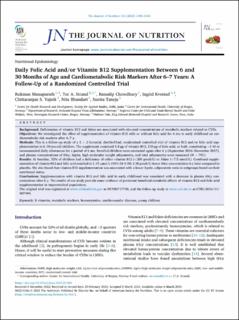Daily Folic Acid and/or Vitamin B12 Supplementation Between 6 and 30 Months of Age and Cardiometabolic Risk Markers After 6–7 Years: A Follow-Up of a Randomized Controlled Trial
Manapurath, Rukman; Strand, Tor Arne; Chowdhury, Ranadip; Kvestad, Ingrid; Yajnik, Chittaranjan S.; Bhandari, Nita; Taneja, Sunita
Journal article, Peer reviewed
Published version

Åpne
Permanent lenke
https://hdl.handle.net/11250/3108996Utgivelsesdato
2023Metadata
Vis full innførselSamlinger
Sammendrag
Background
Deficiencies of vitamin B12 and folate are associated with elevated concentrations of metabolic markers related to CVDs.
Objectives
We investigated the effect of supplementation of vitamin B12 with or without folic acid for 6 mo in early childhood on cardiometabolic risk markers after 6–7 y.
Methods
This is a follow-up study of a 2 × 2 factorial, double-blind, randomized controlled trial of vitamin B12 and/or folic acid supplementation in 6–30-mo-old children. The supplement contained 1.8 μg of vitamin B12, 150 μg of folic acid, or both, constituting >1 AI or recommended daily allowances for a period of 6 mo. Enrolled children were contacted again after 6 y (September 2016–November 2017), and plasma concentrations of tHcy, leptin, high molecular weight adiponectin, and total adiponectin were measured (N = 791).
Results
At baseline, 32% of children had a deficiency of either vitamin B12 (<200 pmol/L) or folate (<7.5 nmol/L). Combined supplementation of vitamin B12 and folic acid resulted in 1.19 μmol/L (95% CI: 0.09; 2.30 μmol/L) lower tHcy concentration 6 y later compared to placebo. We also found that vitamin B12 supplementation was associated with a lower leptin–adiponectin ratio in subgroups based on their nutritional status.
Conclusions
Supplementation with vitamin B12 and folic acid in early childhood was associated with a decrease in plasma tHcy concentrations after 6 y. The results of our study provide some evidence of persistent beneficial metabolic effects of vitamin B12 and folic acid supplementation in impoverished populations.
